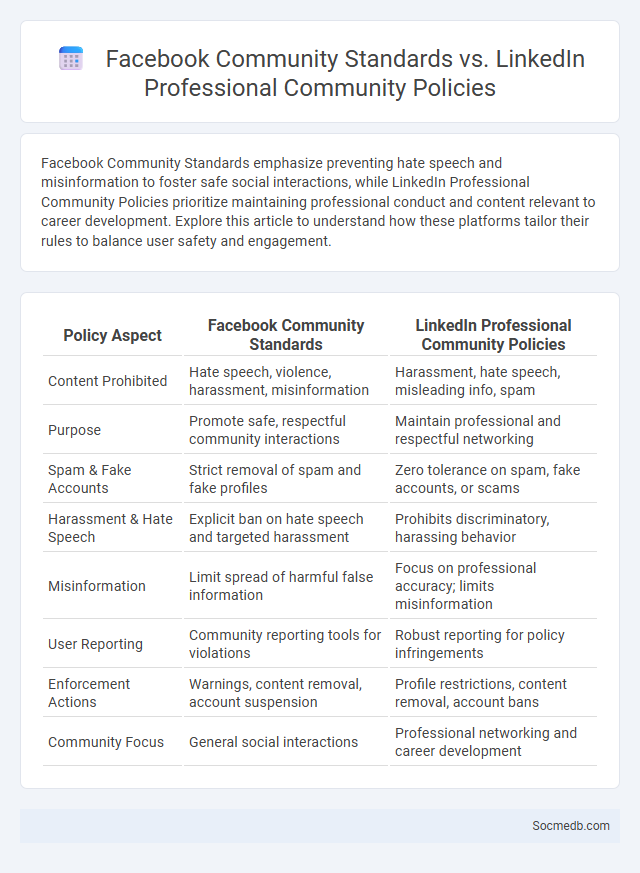
Photo illustration: Facebook Community Standards vs LinkedIn Professional Community Policies
Facebook Community Standards emphasize preventing hate speech and misinformation to foster safe social interactions, while LinkedIn Professional Community Policies prioritize maintaining professional conduct and content relevant to career development. Explore this article to understand how these platforms tailor their rules to balance user safety and engagement.
Table of Comparison
| Policy Aspect | Facebook Community Standards | LinkedIn Professional Community Policies |
|---|---|---|
| Content Prohibited | Hate speech, violence, harassment, misinformation | Harassment, hate speech, misleading info, spam |
| Purpose | Promote safe, respectful community interactions | Maintain professional and respectful networking |
| Spam & Fake Accounts | Strict removal of spam and fake profiles | Zero tolerance on spam, fake accounts, or scams |
| Harassment & Hate Speech | Explicit ban on hate speech and targeted harassment | Prohibits discriminatory, harassing behavior |
| Misinformation | Limit spread of harmful false information | Focus on professional accuracy; limits misinformation |
| User Reporting | Community reporting tools for violations | Robust reporting for policy infringements |
| Enforcement Actions | Warnings, content removal, account suspension | Profile restrictions, content removal, account bans |
| Community Focus | General social interactions | Professional networking and career development |
Overview: Defining Community Standards and Policies Across Platforms
Community standards and policies across social media platforms establish guidelines to maintain user safety, promote respectful interactions, and prevent harmful content such as hate speech, misinformation, and harassment. These frameworks vary by platform but commonly include rules on content moderation, user behavior, and enforcement mechanisms like account suspension or content removal. Platforms like Facebook, Twitter, and Instagram continually update their policies to address emerging challenges and balance freedom of expression with protecting users from abuse.
Facebook Community Standards: Key Principles and Objectives
Facebook Community Standards establish clear guidelines designed to ensure a safe and respectful environment by prohibiting hate speech, violence, and misinformation. These standards prioritize protecting users' rights while fostering authentic interactions and promoting positive connections within diverse communities. Adhering to these principles helps maintain the integrity of your Facebook experience and supports a trustworthy digital space for everyone.
LinkedIn Professional Community Policies: Essential Guidelines
LinkedIn Professional Community Policies establish crucial guidelines to maintain a respectful and productive environment by prohibiting harassment, hate speech, and misinformation. These policies emphasize authenticity, requiring users to provide accurate profiles and engage in professional interactions. Compliance with LinkedIn's community standards fosters trust and enhances networking opportunities within the global professional community.
General Community Standards: Universal Digital Norms
Universal digital norms within social media platforms establish General Community Standards that promote respectful interaction, safeguard user privacy, and prevent harmful content. These standards guide behavior by prohibiting hate speech, misinformation, and harassment, ensuring a safer online environment for diverse global users. Consistent enforcement of these norms fosters trust and accountability, encouraging positive digital engagement across communities.
Content Moderation: Comparing Approaches on Facebook, LinkedIn, and Others
Social media platforms implement diverse content moderation strategies to balance user engagement and safety. Facebook relies heavily on artificial intelligence combined with human reviewers to detect hate speech and misinformation, while LinkedIn emphasizes professional conduct using community guidelines and user reporting. Other platforms adopt varied blends of automated tools and community enforcement to address platform-specific challenges and regulatory requirements.
Privacy and Data Handling: Platform-Specific Rules
Social media platforms implement strict privacy and data handling policies tailored to their unique user bases and functionalities, ensuring compliance with regulations such as GDPR and CCPA. Your personal information, including browsing habits and interaction data, is managed differently across platforms like Facebook, Instagram, and Twitter, affecting data sharing and third-party access. Understanding these platform-specific rules is essential for safeguarding your digital privacy and controlling how your data is used.
Hate Speech and Harassment: Contrasts in Enforcement
Social media platforms exhibit significant contrasts in enforcing policies against hate speech and harassment, often influenced by regional laws, cultural contexts, and company guidelines. Your experience can vary widely, as some platforms employ automated detection systems combined with human moderators, while others rely more heavily on user reporting, leading to inconsistent responses. Understanding these enforcement disparities is crucial for navigating online interactions safely and advocating for more uniform standards across digital communities.
Misinformation and Fake News: Facebook vs LinkedIn Policies
Facebook's policies aggressively target misinformation through fact-checking partnerships and content demotion algorithms, addressing viral falsehoods across its vast user base. LinkedIn prioritizes professional integrity by restricting misleading professional claims and fake endorsements while maintaining a less aggressive stance on general misinformation. Both platforms implement user reporting mechanisms but differ in scope and enforcement intensity due to their distinct user demographics and engagement models.
Account Suspension and Appeal Processes Across Platforms
Social media platforms implement account suspension policies to enforce community guidelines and prevent misuse, often resulting in temporary or permanent restrictions for violating terms of service. Users facing suspension can typically submit an appeal through platform-specific channels, providing evidence or clarification to contest the decision. Platforms like Facebook, Instagram, Twitter, and TikTok have detailed appeal processes with varying response times and success rates depending on the nature of the violation and user compliance.
Future Trends: Evolving Community Standards in Social Networks
Social media platforms are rapidly evolving to address future trends by enhancing community standards that prioritize user safety, content authenticity, and inclusive interactions. Your digital experience will benefit from advanced AI-driven moderation tools and transparent policies designed to reduce misinformation and harmful content. These innovations aim to foster healthier online communities by adapting to shifting societal values and regulatory requirements.
 socmedb.com
socmedb.com